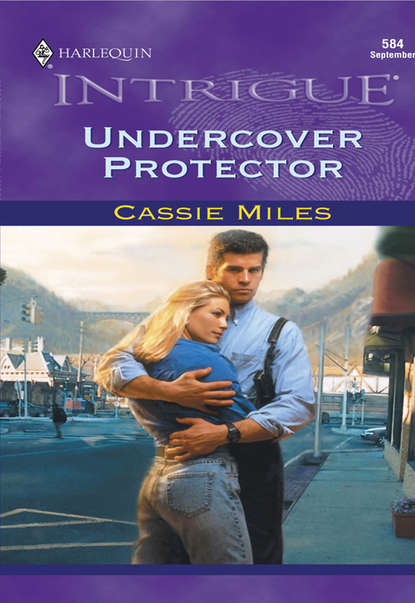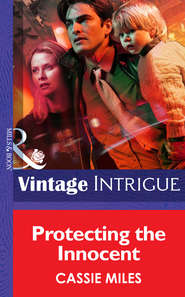По всем вопросам обращайтесь на: info@litportal.ru
(©) 2003-2025.
✖
Undercover Protector
Автор
Год написания книги
2018
Настройки чтения
Размер шрифта
Высота строк
Поля
As a fellow law-enforcement officer, Annie should have taken Engstrom’s side. But there was a dignity in Michael’s silence. He didn’t deny his past. Nor did he try to defend it.
“And drinking,” Engstrom continued with the long-ago rap sheet, “underage possession and consumption of alcohol. Or maybe that was your father.”
“That’s right,” Bobby put in. “Old man Slade was one mean son of a gun when he got drunk.”
Annie couldn’t stand it any longer. “Chief Engstrom, we have a problem here. An act of vandalism.”
But Engstrom was on a roll. He put himself right into Michael’s face. “I’m surprised to see Michael Slade in one piece. With the way he started out, I would’ve thought he’d be dead or in jail by the time he was twenty-five.”
“Disappointed?” Michael asked.
“You only had one thing going for you, Slade. You were the finest wide receiver who ever played for Bridgeport Badgers. I still remember that game against the Cougars.” Engstrom stepped back to pantomime throwing a football. “Jake Stillwell was quarterback. You caught four touch-down passes. Stillwell to Slade. It was a thing of beauty.”
This little trot down memory lane annoyed Annie even more than Engstrom’s former hostility. “If you don’t mind, Chief, we should check the yard for—”
“It’s okay, Annie,” he said condescendingly. “We’re here now, and we’ll protect you. Nobody’s going to hurt you.”
Her muscles tensed with the effort of holding back a frustrated scream. “You can’t imagine how that makes me feel.”
“Besides, if anyone was outside, they probably left when we pulled up.”
“There might be clues,” she said. “Like footprints. Or a cigarette butt. Maybe a chewing-gum wrapper. Something.”
“We won’t find anything in the dark,” Engstrom said. “With the shadows a flashlight casts, we might miss important evidence, might accidentally destroy something.”
“Hey!” came Lionel’s shout from upstairs. “Is that Derek Engstrom?”
“Yes, sir,” Engstrom called back. “Come upstairs with me, Bobby. Let’s see how Lionel is doing.”
“Wait!” Annie pointed to the chunk of brick on the floor. “This is a big fat piece of evidence. Aren’t you going to do anything about it? Take it back to the station and check for fingerprints?”
“Why don’t you put that brick in a grocery bag for me,” Engstrom said. “We’ll grab it on our way out.”
Stunned by their complete lack of professionalism, Annie glared at the retreating backsides of the Bridgeport police as they ascended the stairs. To Michael she said, “I don’t believe this. If I treated a crime scene this way, I’d be booted off the force.”
“We’re in Bridgeport,” he reminded her. “The idiots are running things.”
Though she wanted to speak up for her hometown, the police chief’s behavior was indefensible. “Why does Engstrom have it in for you?”
He shrugged. “In his narrow mind, I’ll always be Michael Slade, teenage troublemaker.”
“And a damn good wide receiver.”
“My only saving grace,” he said. “I could hang on to Jake Stillwell’s wobbly passes.”
She stared down at the piece of brick. “I guess I should go to the kitchen and get a bag for this. It’s probably too porous for decent fingerprints, but you never know.”
“I’ll wait here,” Michael said.
Facing Engstrom had awakened bad memories of his small-town identity as a bad boy. The bitter ache still lingered. No matter where he went or what he did, when he came here, he was still a punk. He couldn’t change that. He was still the son of an abusive drunk who couldn’t hang on to his job at the lumber mill and then deserted the family for good.
Even though Michael had grown up only eight miles from here, his world had been far different from Annie’s. She was a Callahan. Her grandpa was a respected man in town, and they lived in a nice house with rose-patterned windows by the door.
Eleven years ago he’d tried to be worthy of her. He’d backed away from his hoodlum friends, quit smoking and drinking. He even read a book of poetry she’d given him. He tried to be a better person, deserving of Annie’s attention. And he failed.
She returned from the kitchen with a plastic grocery bag and two foil-wrapped chocolates, which she held out toward him and he declined. “More for me,” she said.
She unwrapped them and popped one into each cheek, like a chipmunk. Then she picked up the brick chunk with two fingers. “Nothing remarkable about this piece of concrete.”
When she turned it over, he saw markings on the bottom side. “What’s that?”
Annie studied it. “Black marker. It’s numbers—six, one, three—and there’s a space between the six and the one.”
“Six, thirteen.”
“What do you think it means? A code? An address?”
“Maybe a date,” he said. “June thirteenth.”
It was the anniversary of the worst day of his life, the day his future died. Michael knew exactly why Bateman had thrown a brick through the window. It wasn’t to signal a break-in or to offer an opportunity for a sniper.
The brick was a reminder and a threat. Six. Thirteen. June thirteenth.
Annie placed the brick in a plastic grocery sack. “What does the date mean, Michael?”
He shook his head. He didn’t want to explain to her, but there seemed no way around it. It wasn’t fair to withhold information. “We’ll talk later.”
“Today’s the seventh. June thirteenth is less than a week away,” she said. “Should I be concerned?”
“Yes,” he said tersely. June thirteenth might be the date when Bateman intended to take his final revenge.
She eyed him curiously. “Well?”
“Not now,” he said. “Not with Engstrom upstairs.”
“Fine, we’ll get rid of him. And Bobby. They’re not acting like police, anyway.”
Michael followed her up the staircase to Lionel’s bedroom, where the old man was finishing a harangue about the spread of vandalism in small towns. “…the teenagers don’t respect private property because nobody bothers to teach them about right and wrong.”
Engstrom nodded. “You think teenagers broke your front-door window?”
“I’m not pointing any fingers,” Lionel said. “But Drew Bateman was hanging around earlier.”
“Bateman? I thought he was in jail.”
“He’s out on parole and he’s got some kind of grudge.”
Annie said, “I want to take out a restraining order against Bateman.”











